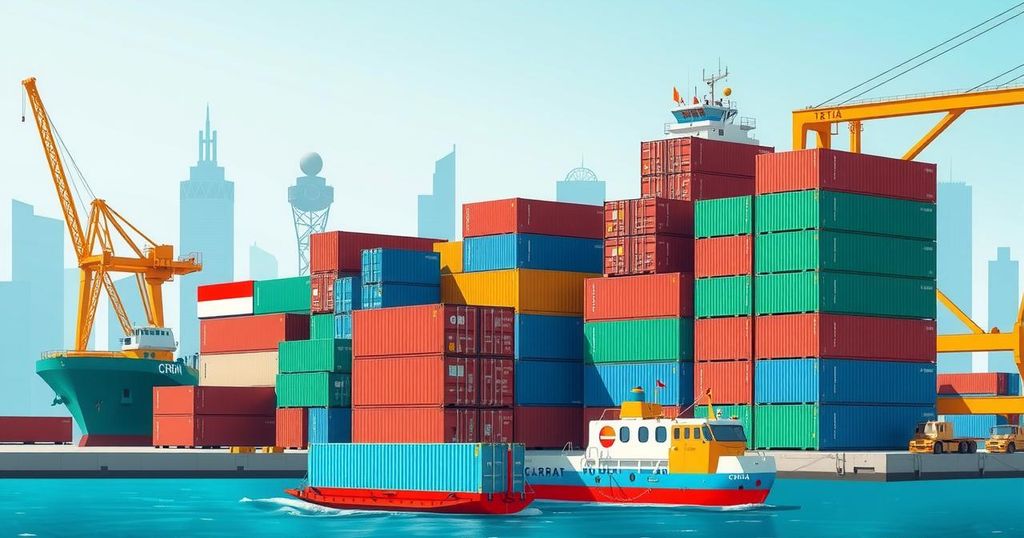Politics
AJ, AJAY SRIVASTAVA, ASIA, BRENDAN LYNCH, CHINA, DONALD TRUMP, FEDERATION OF INDIAN EXPORT ORGANISATIONS, FIEO, FOREIGN INVESTMENT, GEOPOLITICS, GLOBAL TRADE RESEARCH INITIATIVE, GOOGLE, GTRI, INDIA, MEXICO, NORTH AMERICA, SRI, STARLINK, SUPPLY CHAIN, TARIFFS, TESLA, TRADE, UNITED STATES, US, WASHINGTON
Dante Raeburn
Tariff Exemption for India May Enhance Bilateral Trade with the US
Exporters advocate for India’s exemption from US reciprocal tariffs, asserting it would facilitate increased bilateral trade. The FIEO highlights a push towards reaching a trading goal of USD 500 billion. However, skepticism remains regarding the likelihood of exemption amid stringent demands from the US, while negotiations for a bilateral trade agreement are underway aiming for completion by fall 2025.
Exporters have expressed that exempting India from the forthcoming reciprocal tariffs imposed by the United States would significantly enhance bilateral trade between the two nations. They caution that any tariffs on Indian goods could adversely affect shipments to the US. Reports indicate that US President Donald Trump plans to introduce automobile tariffs shortly but may offer exemptions to select countries starting April 2.
The Federation of Indian Export Organisations (FIEO) advocated for India to obtain a waiver from reciprocal tariffs, citing its proactive engagement with the United States across various sectors and the pursuit of a Bilateral Trade Agreement. Ajay Sahai, Director General of FIEO, emphasized that the “Mission 500” initiative aims to elevate bilateral trade from approximately USD 200 billion to USD 500 billion, necessitating unimpeded trade through such exemptions.
Another exporter contended that an exemption for India would mitigate tariff uncertainties, thereby bolstering exports to the US. Despite imposing high tariffs on China already, the Global Trade Research Initiative (GTRI) indicated skepticism regarding India’s chances for an exemption under the Trump administration, especially given his characterization of India as a “high-tariff” nation.
GTRI Founder Ajay Srivastava cautioned that any exemption would require India to concede extensive demands in various sectors beyond trade, including areas such as the operations of Starlink and easing market entry for Tesla. India has already acted to remove the equalization levy on major technology companies. Srivastava encouraged India to maintain a firm stance, asserting that the potential tariffs from Trump, largely driven by whimsy, are unsustainable and will eventually backfire.
Negotiations for a proposed bilateral trade agreement commenced among senior officials from both countries, led by Assistant US Trade Representative Brendan Lynch, aiming for a conclusion by fall 2025. The US seeks greater market access in various sectors, while India may advocate for duty reductions in labor-intensive industries like textiles.
India’s major exports to the US in 2024 encompassed drug formulations, telecom instruments, precious stones, and ready-made garments. Conversely, its key imports included crude oil, petroleum products, and gold. The positions of both nations remain crucial as they navigate these discussions in the evolving trade landscape.
In summary, exporters stress that a tariff exemption for India could enhance bilateral trade with the United States and eliminate uncertainties. While there are prospects for a positive outcome, skepticism persists regarding the likelihood of receiving such exemptions under the current administration. The ongoing negotiations for a bilateral trade agreement further underscore the complexities of trade relations between India and the United States.
Original Source: www.business-standard.com








Post Comment